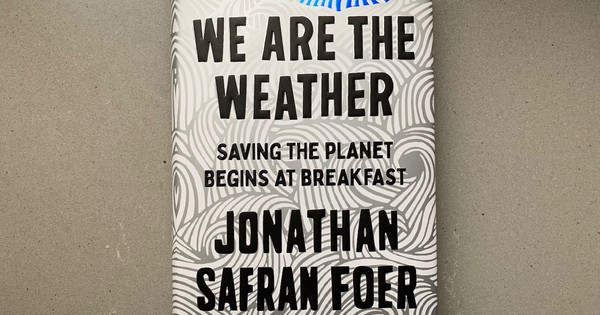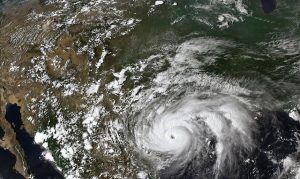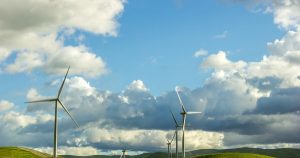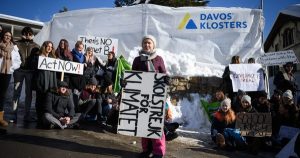'We Are the Weather: Saving the Planet Begins at Breakfast' (book review)

Jonathan Safran Foer argues convincingly that changing our diets is the most effective way to fight the climate crisis.
American author Jonathan Safran Foer has written a moving followup to his 2009 bestseller, Eating Animals, which spurred many people to reduce their consumption of animal products, myself included. Now he has published We Are The Weather: Saving the Planet Begins at Breakfast, which is about more than just what’s on the plate; it’s about the psychology of radical lifestyle change and how to reckon with immediate sacrifice to preserve the wellbeing of future generations.
The first 64 pages barely mention animal products. Instead, Safran Foer skillfully sets the stage for his argument by presenting numerous historical anecdotes, stories of social activism and the horrors of World War II, and describing how people mobilize for change – or, in many cases, do not. He analyzes how people, armed with facts that they know to be true, fail to act because they are incapable of believing them.
But sometimes social waves do start without the help of legislation or leadership, such as the reduction in smoking in recent decades, the spread of the #MeToo movement, getting polio vaccinations, making sacrifices on the American home front during World War II for the sake of troops overseas. He writes,
“Social change, much like climate change, is caused by multiple chain reactions that occur simultaneously. Both cause, and are caused by, feedback loops… When a radical change is needed, many argue that it is impossible for individual actions to incite it, so it’s futile for anyone to try. This is exactly the opposite of the truth: the impotence of individual action is a reason for everyone to try.”
Safran Foer then launches into the bullet-point section of the book that explains climate science in a clear and concise way, building the case for his book’s core argument, that people need to start eating differently in order to save the planet. This is based on the fact that not all greenhouse gases matter equally; methane has 34 times the global warming potential (GWP) as CO2 does over a century and nitrous oxide has 310 times the GWP of CO2.
Because urgent action is needed, it makes more sense to tackle methane and nitrous oxide emissions ahead of carbon dioxide, and the most effective way to do this is by reducing one’s consumption of animal products. Livestock are the leading source of methane emissions (from belching, exhaling, farting, and excreting) and nitrous oxide emissions (from urine, manure, and the fertilizers used for growing feed crops).
Other facts support his argument: “Sixty percent of all mammals on Earth are animals raised for food”; “There are approximately 30 farmed animals for every human on the Earth”; “On average, Americans consume twice the recommended intake of protein”; “About 80 percent of deforestation occurs to clear land for crops for livestock and grazing”; “Not eating animal products for breakfast and lunch saves 1.3 metric tons [of carbon per person] per year.”
What Safran Foer proposes is not to eat animal products before dinner. He’s not making a broad call for vegetarianism, but rather veganism only until dinnertime. (I’ve also heard this referred to as the ‘VB6’ movement, and it’s the topic of another book by Mark Bittman, which I ordered immediately from the library after finishing this one, as well as its accompanying cookbook.) Safran Foer says that “not eating animal products for breakfast and lunch has a smaller CO2e footprint than the average full-time vegetarian diet.” Furthermore, this approach allows people to continue sharing the most meaningful meals:
“I bet that if most people think back over their favorite meals of the past few years – the meals that brought them the most culinary and social pleasure, that meant the most culturally or religiously – virtually all of them would be dinners.”
Does it require a sacrifice? Of course, but it’s a small price to pay now to preserve some semblance of normalcy for our grandchildren’s lives. Think of World War II, he urges. From our vantage point of having won the war, we see the sacrifices made by civilians as the least they could do. And yet, imagine if they’d hadn’t?
“What if those who came before us had refused to make home-front efforts, and we had lost the war? What if the costs were not extreme, but total?… Not a Holocaust, but an Extinction? If we existed at all, we would look back at a collective unwillingness to sacrifice as an atrocity commensurate with the war itself.”
One haunting point he makes that I’ve been thinking about ever since I finished the book is that we need to stop thinking we can preserve our way of life. Sea walls and electric cars and turning off the A/C won’t fix the problem because this civilization, as we know it, is already dead. Put in those stark terms, it makes two vegan meals per day seem like the least we can do.
I think it’s impossible to read this book without one’s relationship to food being seriously affected. Take the time to read it, please. Everyone should. Find it at a local bookstore, library, or online.
Jonathan Safran Foer argues convincingly that changing our diets is the most effective way to fight the climate crisis.
Please enable JavaScript to view the comments.






